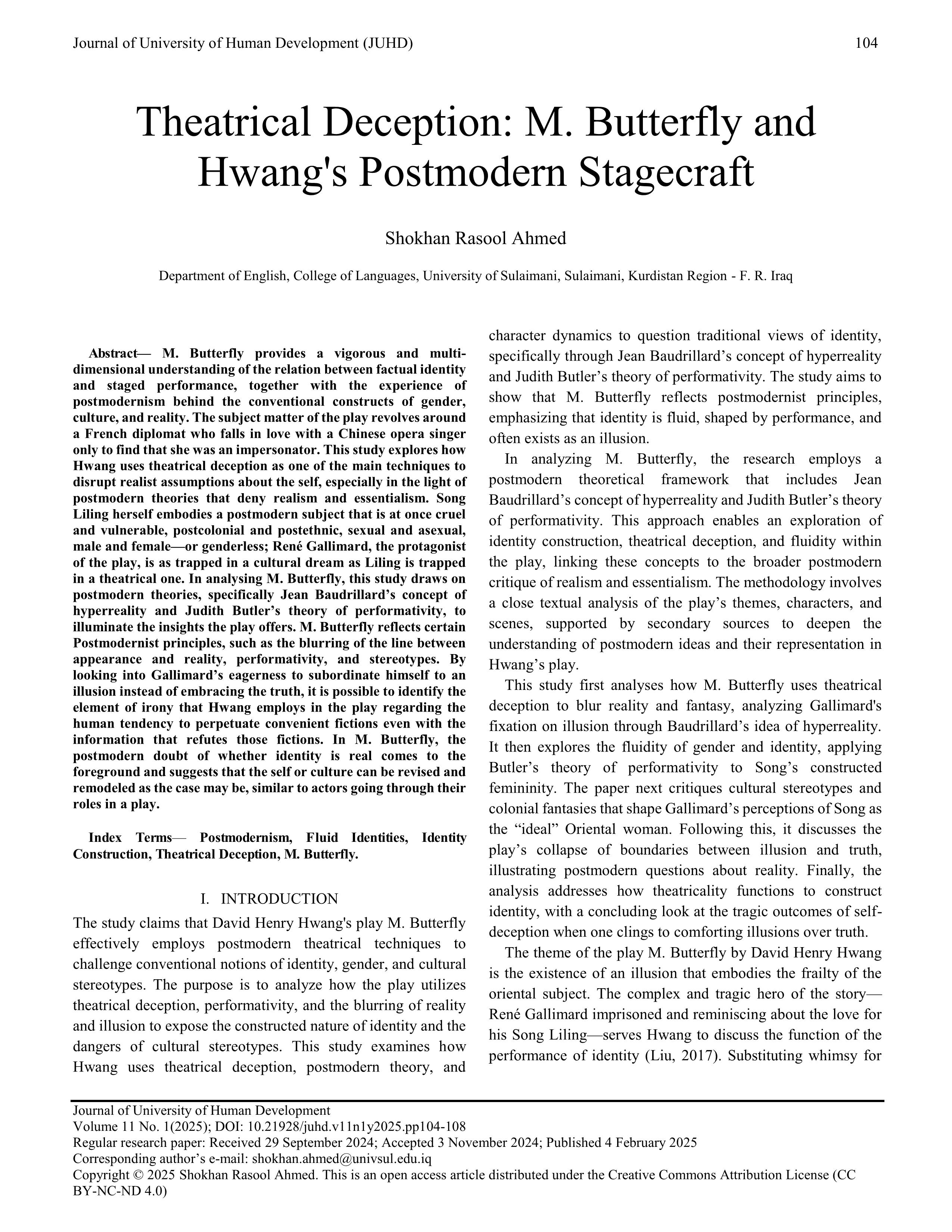Theatrical Deception: M. Butterfly and Hwang's Postmodern Stagecraft
DOI:
https://doi.org/10.21928/juhd.v11n1y2025.pp104-108Keywords:
Postmodernism, Fluid Identities, Identity Construction, Theatrical Deception, M. ButterflyAbstract
M. Butterfly provides a vigorous and multi-dimensional understanding of the relation between factual identity and staged performance, together with the experience of postmodernism behind the conventional constructs of gender, culture, and reality. The subject matter of the play revolves around a French diplomat who falls in love with a Chinese opera singer only to find that she was an impersonator. This study explores how Hwang uses theatrical deception as one of the main techniques to disrupt realist assumptions about the self, especially in the light of postmodern theories that deny realism and essentialism. Song Liling herself embodies a postmodern subject that is at once cruel and vulnerable, postcolonial and postethnic, sexual and asexual, male and female—or genderless; René Gallimard, the protagonist of the play, is as trapped in a cultural dream as Liling is trapped in a theatrical one. In analysing M. Butterfly, this study draws on postmodern theories, specifically Jean Baudrillard’s concept of hyperreality and Judith Butler’s theory of performativity, to illuminate the insights the play offers. M. Butterfly reflects certain Postmodernist principles, such as the blurring of the line between appearance and reality, performativity, and stereotypes. By looking into Gallimard’s eagerness to subordinate himself to an illusion instead of embracing the truth, it is possible to identify the element of irony that Hwang employs in the play regarding the human tendency to perpetuate convenient fictions even with the information that refutes those fictions. In M. Butterfly, the postmodern doubt of whether identity is real comes to the foreground and suggests that the self or culture can be revised and remodeled as the case may be, similar to actors going through their roles in a play.
References
Ateş, M. (2019). From postmodernism to metamodernism: changing perspectives towards irony and metanarratives in Julian Barnes’ sa history of the world in 10 and ½ chapters and the noise of time (Master's thesis, Middle East Technical University).
Bahety, S. (2009). Orientalism in contemporary Asian American literature: mounting Madame Butterfly on the Asian American needle (Doctoral dissertation, Frankfurt am Main, Johann Wolfgang Goethe-Univ., Magisterarbeit, 2009).
Bhattacharjee, S. (2022). The Body Is a (New Materialist) State Apparatus: Agency and the Industrial Body in David Henry Hwang's M. Butterfly. In Theatre, Margins and Politics (pp. 143-155). Routledge India.
Baudrillard, J. (1983). Jean Baudrillard. Fifty Key Sociologists: The Contemporary Theorists, 14.
……………… (2019). Simulacra and simulations (1981). In Crime and Media (pp. 69-85). Routledge. https://www.taylorfrancis.com/chapters/edit/10.4324/9780367809195-8/simulacra-simulations-1981-jean-baudrillard
Butler, J. (1995). Melancholy gender—refused identification. Psychoanalytic dialogues, 5(2), 165-180. https://www.tandfonline.com/doi/abs/10.1080/10481889509539059
………… (2013). Imitation and Gender Insubordination 1. In Inside/out (pp. 13-31). Routledge. https://www.taylorfrancis.com/chapters/edit/10.4324/9780203699553-3/imitation-gender-insubordination-1-judith-butler
………… (2014). Excerpt from gender trouble. In Feminist Social Thought (pp. 112-128). Routledge.
David, E. (2020). From Postmodern Intertextuality to “Decomposed Theater”: Matei Vișniec between Romanian and Francophone Literatures. Christian Moraru, Nicole Simek, Bertrand Westphal (a cura di), Francophone Literature as World Literature, 252-265.
Do, N. (2021). From Madame Butterfly to M. Butterfly: Changing Narratives of Oriental Womanhood. Armstrong Undergraduate Journal of History, 11(2), 132-149.
Donati, K. L. (2024). “I KNOW WHAT NOTHING MEANS”: NOSTALGIA, HOPE, AND THE POSTMODERN SEARCH FOR THE SUBLIME.
Donnelly, R. (2017). Radical Bodies in Music Video: Feminism, Queerness, and Subversive Performance of Gender (Doctoral dissertation, Goldsmiths, University of London).
Furness, J. A. (2011). Where the postmodern meets the postcolonial: I. Allan Sealy's fiction after The Trotter-nama: a thesis presented in fulfillment of the requirements for the degree of Master of Arts in English at Massey University, Palmerston North, New Zealand (Doctoral dissertation, Massey University).
Heise, U. K. (1997). Chronoschisms: Time, narrative, and postmodernism (Vol. 23). Cambridge University Press.
Hwang, D. H. (1988). M. butterfly. Dramatists Play Service Inc. https://books.google.co.ke/books?hl=en&lr=&id=vubuCQXYJSoC&oi=fnd&pg=PA3&dq=M.+Butterfly&ots=S-j8kuVaok&sig=cUR0Jq4DFpXwGgMAUHfv-gXAZmQ&redir_esc=y#v=onepage&q=M.%20Butterfly&f=false
Johnson, M. (2018). ‘Are You My Butterfly?’: The Metamorphosis of M. Butterfly, 1988-2017. Text and Presentation, 125-39.
Lee, E. K. (2015). The Theatre of David Henry Hwang. Bloomsbury Publishing.
Ling, C. T., Shih, C. Y., & Drama, C. W. (2021). Gallimard himself is deceived, not only by the sex of his lover, but the oriental image of a submissive temptress fashioned by Song. Simultaneously, Gallimard’s wife is unaware of.
Liu, Y. (2017). Onstage Transformation and Identity Politics in Contemporary Asian American Theater (Doctoral dissertation, Ohio University).
Lye, C. (1995). M. Butterfly and the Rhetoric of Antiessentialism. The Ethnic Cannon: Histories, Institutions, and Interventions, 260-89.
Panaïté, O. (2017). The Colonial Fortune in Contemporary Fiction in French (Vol. 46). Oxford University Press.
Rossini, J. D. (2006). From M. Butterfly to Bondage: David Henry Hwang's Fantasies of Sexuality, Ethnicity, and Gender. The Journal of American Drama and Theatre, 18(3), 55.
Salih, S. (2007). On Judith butler and performativity. Sexualities and communication in everyday life: A reader, 55-68. https://www2.kobe-u.ac.jp/~alexroni/IPD2020/IPD2020%20No.2/Salih-Butler-Performativity-Chapter_3.pdf
Weis, R. J. (1993). Renaissance Historicism: Selections from English Literary Renaissance. https://www.jstor.org/stable/24321962
Windleburn, M. (2021). Musical Hyperrealism: Exploring Noah Creshevsky’s compositions through Jean Baudrillard’s ideas. Organised Sound, 26(3), 403-412. https://doi.org/10.1017/S1355771821000480
Wolny, R. W. (2017). Hyperreality and simulacrum: Jean Baudrillard and European postmodernism. European Journal of Interdisciplinary Studies, 3(3), 75-79.
Zhang, X., & He, S. (2023). ETHICAL DILEMMA AND NARRATIVE STRATEGIES IN DAVID HENRY HWANG'S M. BUTTERFLY (1988 AND 2017). Kritika Kultura, (42).
Zou, M. (2023). The Plays of David Henry Hwang: Queer Aesthetics, Selves, Cultures (Doctoral dissertation, University of Leeds).

Downloads
Published
How to Cite
Issue
Section
License
Copyright (c) 2025 Shokhan Rasool Ahmed

This work is licensed under a Creative Commons Attribution-NonCommercial-NoDerivatives 4.0 International License.


